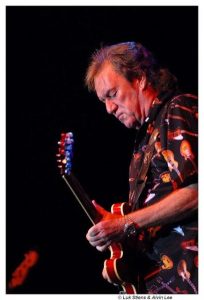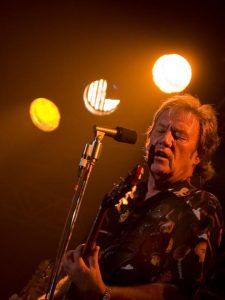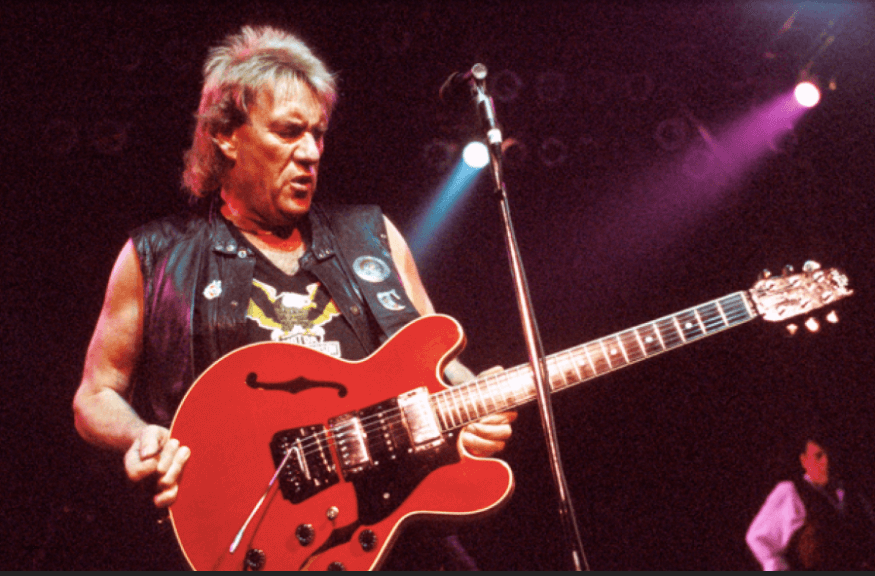During the night of March 6th 2013, a musician friend from Indianapolis rang to let me know the breaking news over there of the sudden death of the legendary UK blues and rock guitarist Alvin Lee. Surely this could not be possible as I had just returned from the States where, on visiting the Slippery Noodle blues venue wearing an Alvin tee shirt, I was mobbed by middle aged men thrusting bottles of Bud in my hand. I listened intently to their animated tales about the Ten Years After front man, nicknamed “Captain Speedfingers,” who made numerous appearances across America at the height of his fame.
I was in shock when I learned of his passing because Alvin was invincible and in any case he was due to perform with Johnny Winter in Paris the following month. I already had the tickets and knew how enthusiastic Alvin was about the forthcoming gig from a recent interview with him:

“I’ve done a bunch of gigs with Johnny Winter on the same bill over the years, but we’ve never played together. Probably won’t this time either. I was at the L’Olympia a couple of years ago with Tony Joe White and the packed house generated a great atmosphere.”
Sadly, it was not meant to be, so instead of arriving in the French capital to see the best blues rockers either side of the pond I found myself at The American Church, 65 Quai d’Orsay on the banks of the Seine on 7th April for an Alvin Lee memorial service. Lifelong devotee, Norwegian Pieter Kentrop had organized this event on behalf of a close-knit community of loyal fans known as “the gang” who had traveled to Paris from all over Europe. Pastor Bruce Morgan gave an inspirational introduction whilst Pieter spoke eloquently and passionately about Alvin’s qualities and lifetime achievements.
American Gospel Music Hall of Fame inductee and one of Alvin’s musical collaborators Mylon LeFevre, now a Pastor, had submitted a reading for the occasion: “Alvin was a good man with a good heart. He was honest, creative, intelligent, kind and loyal. He was a rock superstar, it was an honor to be his friend.” Whilst the grief was unbearable, the sound of the church band quietly sound checking in the background for the next service gave this short, informal ceremony an unexpected but uplifting musical vibe.
The concert at L’Olympia that evening had been rescheduled as Johnny Winter and Guests to be preceded by a moment of silent reflection in tribute to the globally acclaimed musician. As the audience filed into the auditorium, “I’m Going Home” was playing at full volume and for a moment it seemed that Alvin was on stage and all that had happened was just a bad dream. Fans around the world were invited to respect the silence at 7 pm local time, a moving experience honored reverentially by the full house of over 1500 in the auditorium. Alvin Lee would have appreciated the concert, notably the guitar wizardry of Tommy Emmanuel and the technicality and innovation of Robben Ford. Johnny Gallagher played at 100 miles per hour like a young Alvin Lee, Manu Lanvin provided the Americana of Alvin’s In Tennessee album whilst Johnny Winter brought some of the nostalgia of Ten Years After’s rock and roll and R&B.
Turning the clock back, the first time I saw Alvin Lee perform was in 1968 when I was a trainee teacher in Nottingham. Like most students in the 60s, I was in a band and started playing small venues in the city including the Milton’s Head where Alvin had jammed with local aspiring musicians. Everyone I met waxed lyrical about Nottingham’s favorite son and expressed pride and joy in his achievements. I found out why when I saw Ten Years After return from their base in London to perform at The Boat Club on the River Trent which hosted the best progressive rock bands of that era such as King Crimson and Deep Purple. The set reflected the first live album, Undead, an incredible combination of blues and jazz jams culminating in what was to become the band’s national anthem, “I’m Going Home.” Standing there in the crowded, compact, sweaty venue, the home fans roaring Lee on like football supporters, I was in musical heaven.
The 1969 Woodstock festival in New York State is universally regarded as the most important rock concert ever held by becoming a defining symbol of the baby boomers generation and a catalyst for young people’s escapism into music. It was a significant landmark in Alvin’s illustrious career, his high-energy, virtuoso performance in front of an estimated audience of 500,000 propelling Ten Years After to international stardom. When the smash hit documentary, Woodstock was released the following year, Lee’s reputation as an iconic axe man was preserved for posterity on film. Not only that, his distinctive red Gibson E-335 adorned with a peace symbol sticker and dancing hippie man motif made “Big Red” almost as famous as its owner. Alvin was one of the first popular musicians to promote universal peace and love, reinforced through songs such as “I’d Love to Change the World.”
It surprises most aficionados who saw him play that Alvin never achieved the world-class accolades that he deserved. A major music magazine did not even include him in a list of 100 greatest guitarists, nor did he or his band gain entry to the Rock and Roll Hall Of Fame. This did not appear to faze Alvin as he was more concerned about the opinions of his genuine, knowledgeable fans than to follow the path of the Bee Gees and the Dave Clark Five.
Alvin never sought commercial success and hated the prospect of being a pop star at the expense of his musical integrity, preferring to remain true to his roots. However, he did gain satisfaction from Gibson nominating him as the greatest ever exponent of its ES 335 model ahead of such luminaries as Chuck Berry and BB King. From a personal perspective I have watched most blues and rock guitarists perform live over the past half century from Clapton to Page, Beck to Bonamassa, and never seen anyone better than Lee. Even more surprising is that his immense feeling for the blues was not universally recognized despite immortal compositions such as ‘The Bluest Blues” featuring his friend George Harrison on slide. Alvin was brought up listening to his father Sam’s collection of jazz and blues 78s.
“My dad was an avid blues collector so I was brought up with Leadbelly and Big Bill Broonzy. The music was around me all the time and seeped into my brain and fibers; thank God he wasn’t playing James Last. I figured for a white guy to sing and play the blues you have to write and sing about what is personal to you. As much as I like to sing about getting the freight train from Mississippi to Chicago I have never done it. I can imagine the situation but the blues to me is generally real thoughts which go through my mind, like in ‘Motel Blues’ and ‘The Bluest Blues.’ The blues is a way of getting melancholy moments out of your system. It is better than taking it out on your friends and pets.”
Fast-forward to the year 2000 and I am living in Spain, on the Costa del Sol. It was an idyllic existence enhanced when, from a neighboring property, I heard the feint sound of a guitar. Someone who had clearly mastered blues, jazz, rock, and even classical Spanish acoustic styles was playing this superb music for at least two hours every day. It was several weeks before I caught sight of Alvin Lee heading for the beach, the unmistakable swagger and aura of his stage presence instantly confirming his identity. Alvin and his wife Evi were enjoying a well-deserved semi retirement in the sunshine interspersed by the occasional festival gig. Over the next decade we became acquaintances, Alvin granting me several interviews since I had started a second career writing for a little known UK blues magazine. I was amazed at his warm, unassuming manner and lack of ego; he was the antithesis of what I had expected from such a famous musician.

Alvin released two classic albums in the noughties. In Tennessee was recorded in Nashville where Alvin teamed up with his childhood guitar hero Scotty Moore and favorite drummer DJ Fontana for some good old retro rock and roll. On Saguitar, not only had Alvin Lee written all the songs, he composed most of the music for every instrument which makes the album unique and a real treasure chest.
During the last decade of his life, Alvin teamed up with bass player Pete Pritchard and drummer Richard Newman to form a power trio which toured the UK and played at festivals across Europe. Alvin’s last show, the Ribs and Blues Festival in Holland on 28th May 2012, turned out to be a breathtaking display of pure genius by a musician at the peak of his career and one of his best live performances, subsequently released on CD as The Last Show. The self-penned “Slow Blues In C” and Al Kooper’s “I Can’t Keep From Crying Sometimes” confirm that Lee was an exceptional exponent of the blues. “Love Like A Man” with its guitar pyrotechnics and one of the most distinctive, innovative riffs in rock history is a reminder he was right at the top of his game. As Pete summarized later, “Not for Alvin to gradually diminish and fade like a dying ember. He finished still playing brilliantly, still shooting from the hip, still the classic guitar slinger.”
Since 2013, Alvin’s close family has ensured that his legacy is perpetuated for future generations. Evi works tirelessly to keep the official website and Facebook page continuously updated and to oversee new content and releases. She discovered the original never before heard recordings from The Cap Ferrat Sessions in Alvin’s studio and had them re-mixed by producer Chris Kimsey for inclusion in the 1967-74 Ten Years After 10-CD box set. Alvin’s daughter Jasmin is managing director of Dean Street Studios in Soho, London, one of the world’s most famous recording venues. She grew up in studios and started running the family business with her mother, Suzanne Lee Barnes who has vast experience in the music business as a promoter and manager.
“There were always musicians round at our house and Jasmin has a natural empathy for working with musicians and understands what kind of environment they need to bring about the best results. I am very proud of her because she is following her natural path.”
Suzanne is currently music director for Rocking and Racing at The Silverstone Classic, the world’s largest classic motor racing festival organized by Goose Live Events. In July 2019, The Fifty Years After Party was held there to celebrate Woodstock and over 100,000 people attended the legendary Formula 1 Circuit. Fancy dress had been encouraged and hot air balloons lit up the arena for the appearance of Ten Years After bassist Leo Lyons who had graced the Woodstock stage 50 years ago. This time he was with his latest band, the excellent Hundred Seventy Split. This supreme spectacle was the ultimate tribute to Alvin, Ten Years After and the peace, love and music ethos of a festival which both changed the world and the role of youth in society.
The spirit of Woodstock with its very special sense of freedom generated by the hippie counter culture of the late 60s stayed with Alvin throughout his life. His solo career started with the album, On The Road To Freedom in 1973 and ended just under 40 years later with Still On The Road To Freedom, the latter taking the listener on an engaging musical journey linking past and present. Today, “freedom” resonates with making it through the current crisis after a twelfth successive month of living through a coronavirus pandemic. What would Alvin have made of lockdowns? Possibly, he would have welcomed the opportunity to continuing composing, recording and performing his great music. As he told me in our final interview: “It’s too late to get a proper job.”

“There was a time when for me being on tour with a Rock & Roll band playing practically the same thing every night got boring, and believe me if that gets boring you have a big problem because where do you go from there? That’s where the road to freedom comes in.”
The increasing respect and recognition from across the world since he passed away 8 years ago is a tribute to what Alvin achieved in his lifetime. There will only ever be one Alvin Lee and his absence has left a huge void. He really did change the world through the evolution of his timeless and classic music and his promotion of peace. Alvin’s music transcends his mortality and will be remembered and enjoyed for generations to come thanks to the love and dedication of his precious family, Evi, Suzanne Jasmin and all of his fans.
“Music is magic and I can’t think of a world without music when you think about what it does to people. I still wake up on my birthday and play Jerry Lee’s ’Whole Lotta Shakin’, that’s my kind of rock and roll. When I think of music when I was a teenager, for example, when I hear Buddy Holly’s ‘That’ll Be The Day,’ I can see myself standing on the waltzer at Goose Fair in Nottingham watching the girls, I can hear the loud, blaring music and see the flashing lights from the fairground rides and I can smell hot dogs and diesel fumes; the memories all come back from the song. And when I hear Del Shannon’s ‘Runaway’, I am standing in the Locarno Ballroom watching the girls spinning round on the dance-floor with their petticoats flying and their bee-hives bobbing, the memories, the smells and the atmosphere all come back, its pretty amazing. Being involved in music is a privilege and being able to create it, write it and then make it still gives me a big buzz.”
Alvin Lee, RIP.
*Feature image credit: Simon Ritter/Redferns


